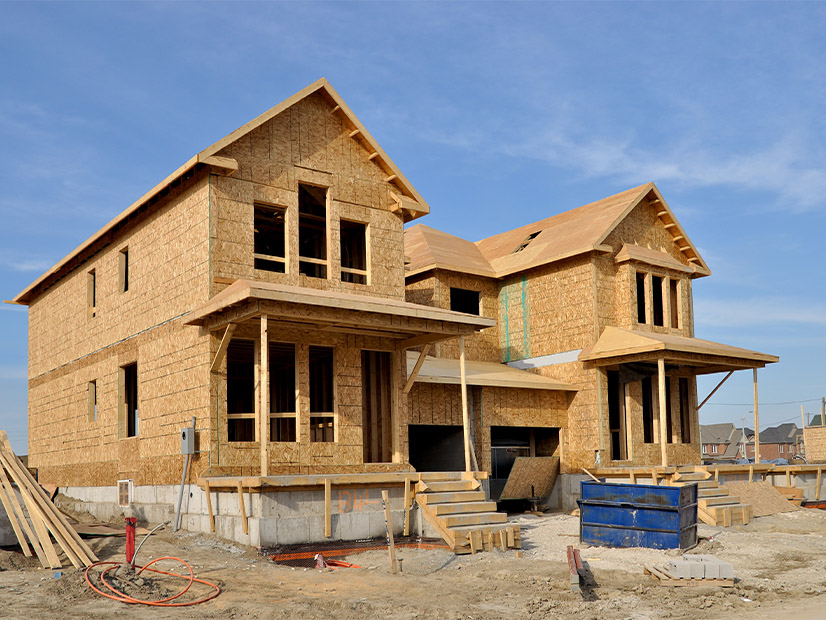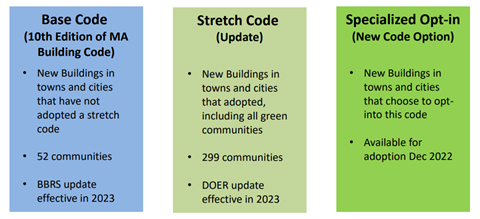
Massachusetts Gov. Charlie Baker’s administration is facing widespread criticism over its proposed net-zero building energy code, with frustrated state representatives, town officials and environmental advocates saying that it doesn’t go far enough.
Proposed updates to the current “stretch” energy code and a new specialized net-zero opt-in option that, along with the states’ base building code, would make up the options for municipalities to adopt once they’re in place, were required by the climate law passed in 2021.
“What we are proposing today would have a significant impact on both our greenhouse gas emissions as well as the cost for residents in these buildings,” said Patrick Woodcock, commissioner of the Department of Energy Resources (DOER), in announcing the straw proposal in February. But the administration’s plan has been criticized by Democrats in the state legislature. (See Mass. Legislators Call for Fossil Fuel Ban in Net-zero Building Code.)
And as DOER held a series of public hearings over the last few weeks, local elected officials piled on, too.
Central to the criticism is that the proposed specialized opt-in code, designed to be the most aggressive option municipalities can adopt, does not allow cities or towns to mandate that all new construction be fossil-fuel free.
Instead, it would require that new buildings that still use fossil fuels be “prewired” for electrification and have rooftop solar when feasible.
The opt-in code should “allow municipalities like Cambridge and Lexington and others that are ready to do so to require fossil-fuel free, all-electric net-zero buildings,” said Quinton Zondervan, a member of the Cambridge City Council.
“We’re not asking the state to impose that requirement on municipalities,” Zondervan said. “We’re asking simply for the permission to require it… in our own municipalities, using our own political processes to make those decisions and to move forward in the way we think is necessary to safeguard the climate and our future.”
 The three types of building energy codes that municipalities could adopt under Massachusetts’ new proposal. | MA DOER
The three types of building energy codes that municipalities could adopt under Massachusetts’ new proposal. | MA DOERA commonly cited document at the hearings was the latest U.N. Intergovernmental Panel on Climate Change report, the most urgent iteration of the series yet, which calls for immediate and ambitious action to combat climate change.
In the face of the report’s urgency, critics see the Baker administration’s proposal as a half measure.
“What I’m seeing so far in the straw proposal is really weak right now, and we can’t wait for incremental, little by little movement to get there, said Alanna Nelson, an elected member of the town planning board in Marian, Mass. “We’ve been doing that for the past 10 years, but we need to move faster.”
Most of the feedback DOER received at the hearings was critical.
Even Michael Ossing, a Marlborough city councilor who said he supports the gradual, “piecemeal” approach taken by the Baker administration, acknowledged that there should be a way for municipalities to move faster.
He asked DOER to consider adding a “no new fossil-fuel energy” option to the code for communities to experiment with on a trial basis.
Five towns in Massachusetts — Acton, Arlington, Brookline, Concord and Lexington — have filed home rule petitions asking to prohibit gas and oil hookups in new buildings.
“While I ultimately think this is the end goal, the immediacy of it is what’s troubling to me,” Ossing said. “Having towns that want to participate … and be a trial balloon for lessons learned is something I think would be a fair approach and something I hope DOER would consider.”
Another of the major criticisms of the new code proposal is that it doesn’t include new requirements for renovations or additions.
“Having a renovation that has base and minimum energy code requirements put to it really just punts the energy consumption of that building for another 10 years,” said Chris Larkum, who runs a residential energy consulting company in Dartmouth, Mass. “It feels counterproductive for the intention of this code.”
The public comment process put on by the state was not immune to the frustration.
“I’m at wits end with the state, and I’m very upset about this process. And I’m upset that there aren’t more people here able to speak about this,” said Jeanne Cahill, an environmental scientist from Northboro.
DOER recently extended the deadline for written public comment to Friday, March 18.
The department will publish full code language later this spring and hold more hearings this summer.


